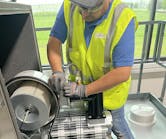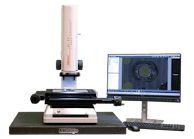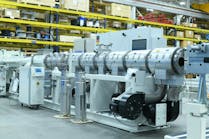By Bruce Geiselman
Fictiv, which acts as a matchmaker between product developers and a network of manufacturing partners, has developed what it calls an industry-first artificial intelligence assistant to help customers choose the right manufacturing material for their projects.
The company’s latest service, Fictiv’s Materials.AI, announced in February, uses OpenAI’s ChatGPT technology, which has been integrated into Fictiv’s online manufacturing platform and extensively trained on Fictiv’s manufacturing data and offerings. To understand how the AI tool works, one first must understand how Fictiv works.
“We are a technology-backed services company that simplifies sourcing for our customers via our platform, our manufacturing partners, and ultimately our boots on the ground – our people,” said Andy Sherman, GM of USA manufacturing at Fictiv.
In other words, Fictiv doesn’t actually perform any of the manufacturing. Instead, it connects product developers, through an online platform, with manufacturers that can produce their products or parts.
“We are the digital layer that helps connect our customers and their bill of materials to a network of hundreds of highly vetted, tightly managed manufacturing partners with whom we have strategic relationships,” Sherman said. “We’re able to provide those customers with design for manufacturability and instant pricing and ultimately allow them to accelerate their time to market and their product development lifecycles.”
Fictiv has agreements with contract manufacturers using additive manufacturing, urethane casting, injection molding, LSR, compression molding, sheet fabrication, machining, die casting and other technologies.
“We are the manufacturer, as far as the customer is concerned,” Sherman said. “They can upload a bill of materials, hundreds of different parts, and we can fulfill that across a wide array of manufacturing processes across our network.”
Fictiv is the customer’s single source of contact.
Fictiv’s new Materials.AI tool helps customers cope with rapid advances in material science and manufacturing technologies, such as 3D printing. For a single design, there may be several materials from which to choose, but consideration must be given to performance, cost, manufacturing efficiency and aesthetics. Materials.AI helps engineers navigate multiple considerations to make fast, informed decisions, according to Fictiv.
The company, in a video introducing Materials.AI, said the artificial intelligence software is like having a manufacturing materials expert available 24/7. A user can enter questions about the best materials for a particular application — such as 3D printing a medical device — and include the material characteristics required, such as heat resistance, and Materials.AI will recommend the best material or materials.
Materials.AI is the latest advancement in Fictiv’s AI-powered manufacturing platform, Sherman said.
“We have a high degree of proprietary machine learning algorithms that we’ve introduced,” Sherman said. For example, before assigning a manufacturing job, Fictiv uses artificial intelligence to analyze a customer’s part design in seconds to determine manufacturability and offer suggestions for improving the design.
“After we produce a part, we leverage the entirety of the performance data throughout our system,” Sherman said. “Was that delivered on time, in full? Were there problems with this particular feature? We leverage that in order to go back and make sure that we're continuing to improve our design for manufacturability algorithms and continually improve the feedback loop that's provided to our customers pre-sale, such that they have a high degree of confidence that when they place the order, it is manufacturable. And our manufacturing partners, when they receive a design from us, they also have high confidence that it's manufacturable. Otherwise, with traditional manufacturing, there's a lot of friction in that back and forth between an OEM and a contract manufacturer.”
Fictiv’s AI for manufacturability can reduce the number of iterations that take place during the manufacturing process, he said. In addition to the artificial intelligence delivering instant, automated warnings about potential design problems, customized recommendations from Fictiv’s manufacturing engineers are available when needed.
Fictiv also uses artificial intelligence when routing work to its various manufacturing partners.
“We take into account on-time performance, in-full performance, the capabilities of each of our manufacturing partners, what is their capability at any given point in time, and a number of other factors to make sure that we’re continuing to fine- tune how we are routing work in the best way possible to ensure that we’re reliably fulfilling our customers’ expectations.”
The goal is to provide their partners with a continuous steady steam of work that aligns with their core competencies and what is most profitable for them.
Partners in Fictiv’s manufacturing network also are adopting smart manufacturing technologies, Sherman said.
For instance, some of Fictiv’s manufacturing partners have adopted automated visual inspection systems for quality control using machine intelligence to determine whether a manufactured part is produced within specifications.
“We have manufacturing partners who’ve leveraged digital twin technology to be able to provide a digital model of their manufacturing facility or a subset of it,” Sherman said. “They are focused on predictive maintenance insights, in particular, to make sure they’re able to reduce machine downtime more proactively and improve utilization, ultimately leading" to fewer failures with critical customers, which obviously can impact your bottom line in a very significant way.”
Fictiv focuses on low- to mid-volume production, Sherman said. It has global operations centers in the U.S., Mexico, India and China. Fictiv has delivered more than 30 million commercial and prototype parts for early-stage companies and large enterprises alike, according to company information.
Contact:
Fictiv, Fremont, Calif., 415-580-2509, www.fictiv.com
Bruce Geiselman | Senior Staff Reporter
Senior Staff Reporter Bruce Geiselman covers extrusion, blow molding, additive manufacturing, automation and end markets including automotive and packaging. He also writes features, including In Other Words and Problem Solved, for Plastics Machinery & Manufacturing, Plastics Recycling and The Journal of Blow Molding. He has extensive experience in daily and magazine journalism.
ABB appoints chief sales officer for B&R
KraussMaffei now building extruders in U.S.







